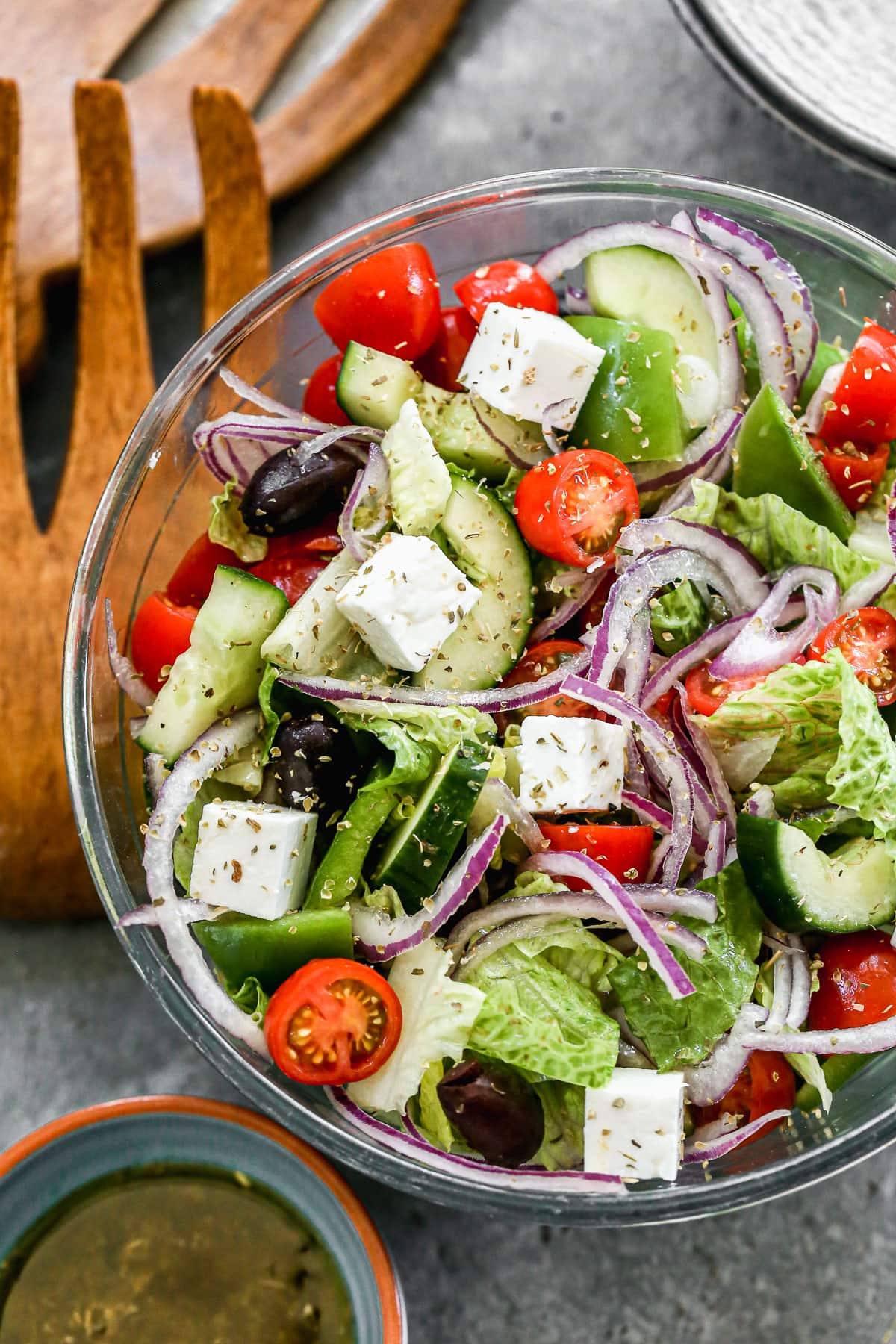A Joyful Journey Through Greece’s Best Salads: A Comprehensive Guide for Parents
Welcome, awesome parents! We’ve crafted a handy, vibrant guide to help you and your kiddos learn about and enjoy the world of Greek salads together. Prepare for a thrilling culinary adventure!
What Makes Greek Salads Special?
The Magic of the Mediterranean
Greek salads are more than just a dietary staple; they’re a vibrant celebration of Greece’s rich agricultural bounty. Traditionally decked with juicy tomatoes, crisp cucumbers, sharp onion rings, green bell peppers, creamy feta cheese, and plump Kalamata olives, these salads exemplify the magic of the Mediterranean.
Harnessing the Power of Fresh Ingredients
Greek salads are renowned for their fresh, local, and seasonal ingredients bursting with health benefits. Packed with vitamins, antioxidants, and the heart-healthy mono-unsaturated fats, Greek salads are an excellent way to introduce your child to nutritious and delicious eating.
Greek Traditions in Every Bite
Greek salads are an essential part of the Greek dining experience. They carry the essence of Greek tradition, culture and family values, making them a wonderful and engaging way to teach your child about the world’s diverse food heritage.
Popular Greek Salads to Try
Horiatiki (Traditional Greek Salad)
Test the waters of the Aegean Sea with Horiatiki, the classic Greek salad. Its mouthwatering combination of tomatoes, cucumbers, onion, bell pepper, olives, and a generous block of feta cheese, sprinkled with dried oregano and drenched in olive oil, promises a tantalizing taste sensation that’s sure to please little taste buds.
Dakos Salad
Discover the Cretan countryside with the Dakos salad. This hearty dish features barley rusks, ripe tomatoes, feta or mizithra cheese, capers, and olives. The dakos is then dressed generously with olive oil and a sprinkle of dried herbs to foster a love for healthy, rustic meals in your growing gourmet.
With this guide at your fingertips, introducing your kids to diverse, delicious, and nutritious dining experiences will be as joyous as a sun-drenched afternoon in a Greek olive grove. Ready, set, let’s delve deeper into the Greek salads!

Helpful Tips for Serving Greek Salads
Making It a Fun Process
Transform salad making into an engaging activity. Encourage your little ones to participate; they can wash veggies, tear lettuce, and sprinkle cheese. Creating a fun and collaborative atmosphere around food nurtures a positive attitude towards healthy eating.
Rainbow on a Plate
Use the varied colors of Greek salad ingredients as an educational opportunity. Label each ingredient with their color, let your child group them, creating a rainbow on their plate. This will not only make the salad look appealing but also stimulate your child’s learning about different colors.
Dressing on the Side
Kids can sometimes find the taste of salad dressing overpowering. Serve the dressing on the side, allowing them to add as much or as little as they like. This step gives your child control over the flavor of their salad and encourages them to try new tastes at their pace.
Let Them Choose
Make Greek salads customizable. Offering a variety of Greek salad toppings like olives, feta cheese, stuffed grape leaves will empower your child to make their own food decisions and foster independence.
Happy and Healthy Greek Salad Journey
Creativity, fun, and a spoonful of Greek sunshine are key ingredients to making salads exciting for your child. Guided by the principles of Greek cuisine – simplicity, freshness, and love, creating Greek salads will be a thrilling and healthy culinary journey for your entire family. So, here’s to happy mixing, tossing, and munching!
Hoping this guide gives you a newfound love for Greek salads and helps you in your mission to nurture healthy and diverse food habits within your family. Enjoy, fellow parents, and remember – every healthy choice is a stepping-stone towards an adventurous, fulfilling, and active lifestyle for your child. Yamas (Cheers)!
Preparing Greek Salads: 5 Key Tips for Parents
Planning to prepare a Greek salad at home? Here are five things every parent needs to bear in mind. This versatile and refreshing dish is not just delectable, but also packed with nutrients that are great for both parents and kids!
1. Use Fresh Ingredients
The primary factor driving the unique taste of Greek salads is the use of fresh ingredients. Observe how each vegetable used, such as cucumbers, tomatoes, onions, and bell peppers, appear visibly fresh and vibrant in color.
2. Quality of Feta Cheese
The feta cheese is the hero of Greek salads. Always opt for high-quality cheeses, and choose one that is crumbly yet creamy for the perfect taste and texture.
3. Dress it Right
The dressing is yet another significant part of Greek salads. A simple dressing of extra virgin olive oil, lemon juice or red wine vinegar, and seasonings like oregano and salt and pepper bring out the overall flavor.
4. Understand the Art of Combination
Greek salads maintain a delicate balance of flavors and textures. Complementing this harmony is necessary when adding or substituting elements. For instance, keep a mix of crunchy and soft veggies and don’t forget to add salty feta and olives to balance.
5. Make it Nutritious
Greek salads are naturally packed with nutrients. However, you can also incorporate elements like chickpeas or quinoa for extra protein, making it a wholesome meal for your children.
By keeping these tips in mind, you can prepare a Greek salad that’s not just authentic but also nutritious and delicious. Happy cooking!
For more great articles please see here. For more information see here
Disclaimer
The articles available via our website provide general information only and we strongly urge readers to exercise caution and conduct their own thorough research and fact-checking. The information presented should not be taken as absolute truth, and, to the maximum extent permitted by law, we will not be held liable for any inaccuracies or errors in the content. It is essential for individuals to independently verify and validate the information before making any decisions or taking any actions based on the articles.




